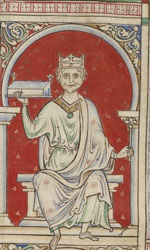On This Day: William II of England
Posted on
On this day, 2nd August 1100, King William II of England went hunting in the New Forest. He would not come home.
A Younger Son
When he was born in 1056, no one could have seriously considered him as a future King of England. For a start the famous Battle of Hastings was still ten years away. More than that though, he was far from his father's heir as he was preceded by his brothers Robert and Richard, five and two years older than him respectively.
William was raised in his father's duchy of Normandy. Over time he was joined by a younger brother Henry, and the boys had several sisters as well (although records aren't clear on the dates of birth of the girls, or even how many girls there were). It appears that even in his youth he didn't get along with his eldest brother Robert, as one story related in the chronicles tells us that he and Henry once emptied a chamberpot over Robert's head as a "joke". His nickname, "William Rufus", is believed to have come from a rather red-faced complexion.
The rift between the brothers continued in to adolescence when Robert rebelled against their father. William the Conqueror was reluctant to relinquish any power to his eldest son (as his great-grandson, Henry II, would also find problematic), and this led to a rebellion. William was firmly on the side of his father, and rode out at his side to help fight against Robert. The eldest son's rebellion finally ended when the boy's mother, Matilda of Flanders, intervened.
King of England
Having created a a healthy patrimony from the kingdom of England and the duchy of Normandy, you would think that William the Conqueror would want to keep these two regions together. However on his death he made Robert his heir to Normandy and his second son, now William (Richard had died in a hunting accident in 1075) his heir to England, while his youngest son Henry was left some money.
William Rufus quickly set about capitalising on the settlement by promptly waging war on Robert. The campaign would prove to be unsuccessful, neither of the men had quite the same amount of skill as their father, and in the end a stalemate led to the two childless brothers coming to terms and agreeing that each was the other's heir. If William died before he had a son, Robert would inherit England, and if Robert died then William would inherit Normandy. Several years later peace was suitably settled enough for Robert to feel safe enough to go on Crusade. Before he left he handed control of his duchy to William, to rule in his absence. He certainly trusted his brother more than he trusted his lords.
Given how much was at stake in terms of inheritance, it's surprising that William never married. There were plenty of eligible brides, even if he didn't want to marry an English woman from one of the noble families. His sisters had been married to various European nobles, such as his sister Adela who married Stephen of Blois, and there would have been some eligible sisters of these men, or even a Princess of France. The fact that he didn't marry, coupled with some reports from chronicles, has led people to suggest that he was gay. Certainly he didn't have any illegitimate children either, which would suggest that he either wasn't interested in women or was infertile. Either way, it would pave the way for his brother Henry to take advantage when opportunity presented itself.
Accident?
William was a keen hunter, like many men of his time, and England had numerous parks and lands where the king could indulge in the "chase". As he set out on a hunt through the New Forest, William was accompanied by various nobles, including young Henry.
Whether or not you think it was an accident, or an assassination, the bare facts are clear. William was hit by an arrow fired by one of the men in the party, and died almost instantly. Some chronicles stated that the man had been put up to it by Henry, who was determined to take his brother's throne, while others felt that it was an "Act of God" as William had frequently argued with the Church during his reign.
If it was an accident, then Henry showed remarkable presence of mind. He promptly raced to Winchester, where he took control of the Royal Treasury, and then equally as quickly raced up to London, where he was crowned King Henry I of England three days later. Technically Robert was William's heir, but Robert wasn't in England, and so Henry got away with it. Henry would prove to be more ruthless than his older brothers, after the Battle of Tinchebrai he captured Robert, and locked him up for the rest of his life, appropriating Normandy and reuniting it with England.
The story goes that William's body was left in the forest for several days. He hadn't been particularly popular, and it took a while for anyone to get round to retrieving his remains. He was eventually buried in Winchester Cathedral.
____________
If you're a fan of William Rufus, you can check out his badge.